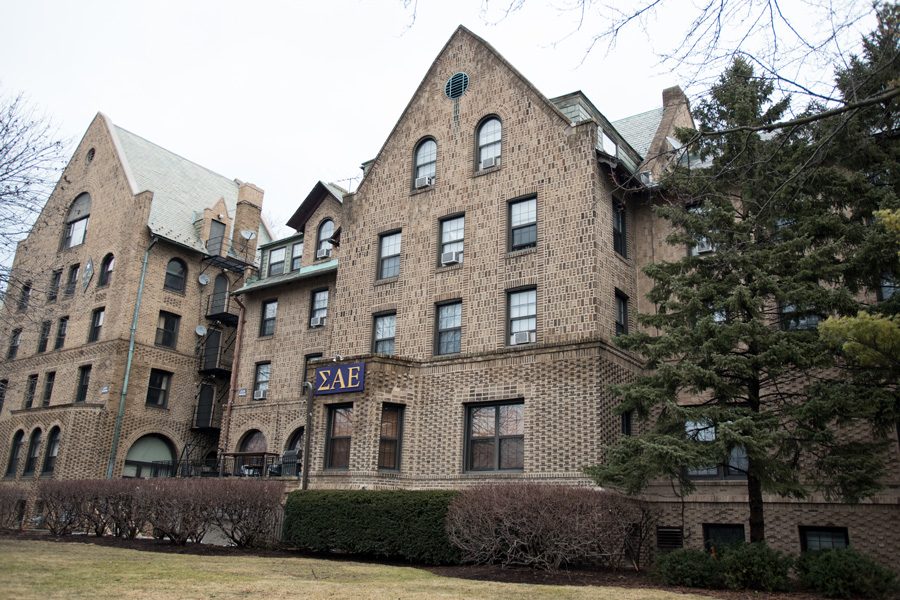Students express varied reactions to SAE suspension
Daily file photo by Colin Boyle
Sigma Alpha Epsilon fraternity’s house on Northwestern’s campus. The University suspended the chapter from campus Friday after concluding SAE had violated a disciplinary probation.
April 24, 2017
SESP sophomore Cate Ettinger said she felt bittersweet when the University announced the suspension of Sigma Alpha Epsilon fraternity Friday.
Ettinger said even though the chapter’s suspension was ultimately a success for student activists, she was disappointed an alcohol violation brought the disciplinary action instead of a charge of drugging and sexual assault.
The University announced Friday the suspension, which runs until September 2018 for violating an already standing probation by serving alcohol to minors. The probation, which was set to be in place until the end of 2017, followed a conduct investigation in Fall 2016, University spokesman Bob Rowley said. The University decided to suspend the chapter following a hearing April 7, he said.
The chapter “knowingly violated” its disciplinary probation, Rowley said, and had been “repeatedly hosting parties and providing alcohol to minors.”
The suspension is not in connection with the Title IX investigation, which was conducted earlier this year. In February, the University announced in an email to students that the Sexual Harassment Prevention Office had received an anonymous report that four female students had been possibly given a date rape drug at the SAE house on Jan. 21. The report said two of the students believed they were sexually assaulted.
The fraternity’s national organization issued a “cease-and-desist” order to the fraternity in February shortly following the allegations were announced.
The University announced in an email to students March 30 that no disciplinary action would be taken against SAE in connection with the drugging and sexual assault allegations.
“As happy as I am that they are being suspended, it still felt like a slap in the face to women that the reason for the suspension was over alcohol-related policy rather than sexual assault,” Ettinger said. “I’m just looking on the positive side that something’s happened, but it is a little frustrating.”
SESP junior Rodney Orr, president of the Interfraternity Council, said following the student Code of Conduct is important for a safe campus.
Orr said IFC needs to recognize that some students feel unsafe in their spaces, and fraternities must reform their culture “from within” to change students’ perceptions of fraternities.
“What this really means for us, though, is that we’re just going to continue to push the initiatives that we’ve been pushing, pushing the policy changes, pushing the cultural, ideological changes, continuing to really engage in this topic,” Orr said.
Associated Student Government executive vice president Rosalie Gambrah said she hopes to end policies restricting students who are 21 or older from consuming alcohol on campus. The student Code of Conduct currently prohibits the consumption of alcohol in all Greek housing and certain designated areas in residence halls and academic buildings.
“We don’t have involvement in cases of misconduct,” the Weinberg junior said. “We just want to continue advocating for continual improvements to survivor support on campus.”
A spokesman for SAE did not respond to repeated requests for comment.
Although Ettinger said she is happy with the University’s decision, she said sexual assault is still an issue on campus. Pushing for continued dialogues with IFC men about the challenges of being women on Northwestern’s campus could help create more understanding, she said.
“Bottom line, (I’m) very happy that they’re gone,” Ettinger said. “They saw some semblance of justice and disciplinary action. It’s just not the ideal way it (should’ve) happened.”
Correction: A previous version of this story misstated the contents of a University email to students. No disciplinary action will be taken against SAE in connection with reports of alleged druggings and sexual assaults. The Daily regrets the error.
Email: [email protected]
Twitter: @ericasnoww


